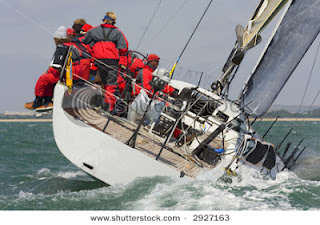I had a interesting chat with a friend the other day, where he recounted this quote from a world record beating sailor (I forget the name, but it is not critical to the story).
With any new suggestion for additional 'stuff' for his craft (especially technology), he would always respond 'will it make the boat go faster?'.
It got me thinking that to be a leader in a business or even to win anything, we need to very clear in distilling the key elements of success to their very essence. Hence, clearly (although I am hardly even 'competent crew' as my sailing friends will attest) it seems that a leading indicator of success in ocean racing is to have a fast, and consequently light, boat.
It's an interesting thought when you apply to business. I watched the news on TV this morning and listened to Sir Martin Sorrell, CEO of WPP, talk of their record results just announced where they have broken through the 10billion (sterling) revenue barrier, with record EBITDA.
These seemingly random inputs this week got me thinking about received wisdom. The dominant theme in driving efficiency (and thus profit) in big companies is around transformation and standardisation in common processes, a shift to shared services and common, single instance global ERP systems. This has become almost a religion, and I have to say my company is involved in this too. A whole industry has grown up around advising, executing, reviewing and benchmarking this kind of 'finance transformation'.
Back to the sailor. Very interesting to ask with all these initiatives - 'will it make the boat go faster?'
Whilst generally senior executives will answer a resounding 'yes', there is less evidence than we might expect. Certainly there is a high correlation between leading firms and these transformation strategies. But is there a causation, or is it just the trend that all successful firms feel the need to follow?
This brings me round to some of the giants of business today who eschew such standardisation. WPP is a tremendous business and a global leader in its field. Do they standardise? From my friends there I know the answer is 'ONLY IF IT MAKES THE BOAT GO FASTER' . . . Hence, WPP is a powerful network of marketing agencies, not an organizational behemoth with centralised planning, execution and control.
Likewise, BMW, one of the leading global automotive brands and a client of my firm, don't blindly follow the standardisation and centralistion philosophy. They respond to such challenges with the response 'only if it sells more cars' . . .
Now, to be clear, there is standardization and common systems at these organizations, but they rigorously challenge the scope at which standardization and consolidation makes business sense.
There is a lot to be said for individual business unit responsibility and accountability, and obviously there is a question where on the spectrum to make the call.
Food for thought I think. How many other global leaders in their industries take this particular 'road less travelled'?
Thanks for reading . .
Thursday, March 1, 2012
Subscribe to:
Post Comments (Atom)

Thought provoking and a good allegory to make sure it will be remembered. Tnx.
ReplyDelete